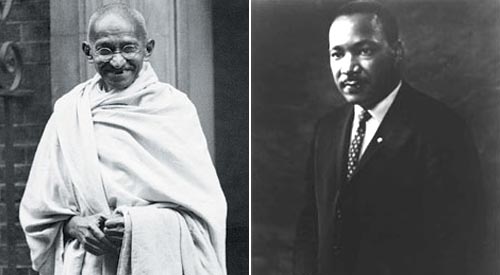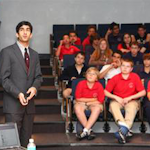Nite Cap UPDATE
UPDATE UPDATE UPDATE UPDATE

On Edu-Blogging While Negro [We Ain't Even Supposed To Be Here]

Mahatma Gandhi and Martin Luther King Jr.
When it comes to race, or any marginalized group, those most affected (or disaffected, as it were) have to teach
State Of The Union Proposes Major Preschool Expansion
President Barack Obama proposes a major initiative to expand preschool opportunities for 4-year-olds in Tuesday's State of the Union address.
The Huffington Post reported last month the White House was considering such a plan. A fact sheet circulated Tuesday by the White House as a supplement to the State of the Union outlines the proposal:
The initiative comes after states have cut preschool budgets by an average of $700 per child over the last decade and as mounting evidence shows the importance of quality preschool in closing the achievement gap for low-income students.
The Huffington Post reported last month the White House was considering such a plan. A fact sheet circulated Tuesday by the White House as a supplement to the State of the Union outlines the proposal:
The President is proposing to work with Congress to provide all low- and moderate-income 4-year-old children with high-quality preschool, while also expanding these programs to reach hundreds of thousands of additional middle class children, while also incentivizing full-day kindergarten policies, so that all children enter kindergarten prepared for academic success.
The initiative comes after states have cut preschool budgets by an average of $700 per child over the last decade and as mounting evidence shows the importance of quality preschool in closing the achievement gap for low-income students.
Breaking News: Riverbank Charter School Of Excellence Withdraws Expansion Application
Earlier this evening the following letter was posted on the Facebook page of the Riverbank Charter School of Excellence by Lead Person/Principal Beth Kelley:
February 12, 2013
Dear Parents,
It is with a heavy heart that I must inform you that the Board of Trustees voted to withdraw the application for expansion of our school.
This was not decided upon lightly and rest assured that all avenues
 Here is the part of President Obama’s State of the Union address related to education (from a transcript provided by the White House):
Here is the part of President Obama’s State of the Union address related to education (from a transcript provided by the White House):…These initiatives in manufacturing, energy, infrastructure, and housing will help entrepreneurs and small business owners expand and create new jobs. But none of it will matter unless we also equip our citizens with the skills and training to fill those jobs. And that has to start at the earliest possible age.Study after study shows that the sooner a child begins learning, the better he or she does down the road. But today, fewer than 3 in 10 four year-olds are enrolled in a high-
Obama on education in State of Union address
Here is the part of President Obama's State of the Union address related to education (from a transcript provided by the White House):
These initiatives in manufacturing, energy, infrastructure, and housing will help entrepreneurs and small business owners expand and create new jobs. But none of it will matter unless we also equip our citizens with the skills and training to fill those jobs. And that has to start at the earliest possible age.
Study after study shows that the sooner a child begins learning, the better he or she does down the road. But today, fewer than 3 in 10 four year-olds are enrolled in a high-quality preschool program. Most middle-class parents can't afford a few hundred bucks a week for private preschool. And for poor kids who need help the most, this lack of access to preschool education can shadow them for the rest of their lives.
Tonight, I propose working with states to make high-quality preschool available to every child in America. Every dollar we invest in high-quality early education can save more than seven dollars later on by boosting graduation rates, reducing teen pregnancy, even reducing violent crime. In states that make it a priority to educate our youngest children, like Georgia or Oklahoma, studies show students grow up more likely to read and do math at grade level, graduate high school, hold a job, and form more stable families of their own. So let's do what works, and make sure none of our children start the race of life already behind. Let's give our kids that chance.
Let's also make sure that a high school diploma puts our kids on a path to a good job. Right now, countries like Germany focus on graduating their high school students with the equivalent of a technical degree from one of our community colleges, so that they're ready for a job. At schools like P-Tech in Brooklyn, a collaboration between New York Public Schools, the City University of New York, and IBM, students will graduate with a high school diploma and an associate degree in computers or engineering.
We need to give every American student opportunities like this. Four years ago, we started Race to the Top a competition that convinced almost every state to develop smarter curricula and higher standards, for about 1 percent of what we spend on education each year. Tonight, I'm announcing a new challenge to redesign America's high schools so they better equip graduates for the demands of a high-tech economy. We'll reward schools that develop new partnerships with colleges and employers, and create classes that focus on science, technology, engineering, and math the skills today's employers are looking for to fill jobs right now and in the future.
Now, even with better high schools, most young people will need some higher education. It's a simple fact: the more education you have, the more likely you are to have a job and work your way into the middle class. But today, skyrocketing costs price way too many young people out of a higher education, or saddle them with unsustainable debt.
Through tax credits, grants, and better loans, we have made college more affordable for millions of students and families over the last few years. But taxpayers cannot continue to subsidize the soaring cost of higher education. Colleges must do their part to keep costs down, and it's our job to make sure they do. Tonight, I ask Congress to change the Higher Education Act, so that affordability and value are included in determining which colleges receive certain types of federal aid. And tomorrow, my Administration will release a new "College Scorecard" that parents and students can use to compare schools based on a simple criteria: where you can get the most bang for your educational buck.
To grow our middle class, our citizens must have access to the education and training that today's jobs require. But we also have to make sure that America remains a place where everyone who's willing to work hard has the chance to get ahead.
Our economy is stronger when we harness the talents and ingenuity of striving, hopeful immigrants. And right now, leaders from the business, labor, law enforcement, and faith communities all agree that the time has come to pass comprehensive immigration reform .
Read full article >>
Washington state legislators $1 billion apart on school reform
Lawmakers from both parties say the differences are not so far that they won’t be able to work out a compromise before the Legislature goes home this spring.
Oregon education czar Rudy Crew demands another, tougher set of education goals -- this time for himself
Crew and the Oregon Education Investment Board say they aim to have 15 percent more third-graders read at grade level, 10 percent more low-income and minority students go to college and 15 percent more middle schoolers proficient in math and science by 2015
The Full Text of President Obama's 2013 State of the Union Address
On Tuesday evening President Obama delivered the State of the Union address, focusing on the economy — particularly job creation, by way of manufacturing, energy, infrastructure, and housing — and a broader theme of citizenship that echoed but perhaps centered his rhetoric at the end of the campaign trail. He also proposed raising the minimum wage to $9.00 and acknowledged the apparent North Korean nuclear test. He did not call upon Congress to bring an assault-weapons ban to a vote. Above all, the President called on Washington to make itself work again: "It is our unfinished task to make sure that this government works on behalf of the many, and not just the few," Obama said, according to remarks released beforehand, "that it encourages free enterprise, rewards individual initiative, and opens the doors of opportunity to every child across this great nation of ours."
The full text of Obama's address, as prepared for delivery, can be found below, and you can follow our State of the Union live blog right here. The speech comes in at 6,513 words — these words:

Remarks of President Barack Obama – As Prepared for Delivery:
Mr. Speaker, Mr. Vice President, Members of Congress, fellow citizens:
Fifty-one years ago, John F. Kennedy declared to this Chamber that “the Constitution makes us not rivals for
The full text of Obama's address, as prepared for delivery, can be found below, and you can follow our State of the Union live blog right here. The speech comes in at 6,513 words — these words:

Remarks of President Barack Obama – As Prepared for Delivery:
Mr. Speaker, Mr. Vice President, Members of Congress, fellow citizens:
Fifty-one years ago, John F. Kennedy declared to this Chamber that “the Constitution makes us not rivals for
Cyberbullying Expert Says School Climate Makes All the Difference
Dr. Sameer Hinduja speaks frequently at schools. A new book of his, especially for teenagers, will come out in 2014, he says.
 BOCA RATON, Fla. – Dr. Sameer Hinduja, an associate professor in the school of criminology and criminal justice at Florida Atlantic University, has studied cyberbullying since 2002. The now-co-director of the Cyberbullying Research Center admits being bullied himself as a boy, and says building a good school “climate” gets to the root of the problem.
BOCA RATON, Fla. – Dr. Sameer Hinduja, an associate professor in the school of criminology and criminal justice at Florida Atlantic University, has studied cyberbullying since 2002. The now-co-director of the Cyberbullying Research Center admits being bullied himself as a boy, and says building a good school “climate” gets to the root of the problem.“Create a climate related to connectedness, belongingness, safety, school spirit, good morale,” says Hinduja, 35, an associate professor of criminal justice at Florida Atlantic University who has co-authored several books
